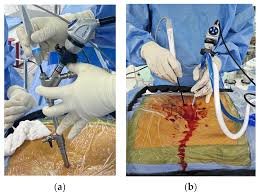Endoscopic spine surgery has revolutionized spinal care in Nagpur, offering patients minimally invasive solutions for various spinal conditions. This technique provides numerous benefits, including reduced recovery time, minimal scarring, and decreased postoperative discomfort.

What is Endoscopic Spine Surgery?
Endoscopic spine surgery is a minimally invasive procedure that utilizes an endoscope—a thin, flexible tube equipped with a camera and light—to access and treat spinal issues. Unlike traditional open surgeries, this method requires only small incisions, leading to less tissue damage and quicker recovery.
Advantages of Endoscopic Spine Surgery
- Minimized Tissue Trauma: The procedure causes less disruption to muscles and soft tissues, resulting in reduced postoperative pain.
- Smaller Incisions: Typically, incisions are less than 1 cm, leading to minimal scarring and faster healing.
- Reduced Blood Loss: The minimally invasive nature of the surgery often results in less intraoperative bleeding.
- Shorter Hospital Stay: Patients often experience quicker recovery times, allowing for earlier discharge from the hospital.
- Lower Infection Risk: Smaller incisions and reduced exposure decrease the likelihood of postoperative infections.
Types of Endoscopic Spine Surgeries
- This procedure involves removal of herniated disc material pressing on spinal nerves. It can be performed via transforaminal or interlaminar approaches, depending on the disc’s location.
- Used to treat lumbar spinal stenosis, this surgery removes tissues causing pressure on the spinal cord, such as ligamentum flavum or overgrown facet joints.
- In cases of spinal instability, this procedure involves removing the degenerated disc and inserting a bone graft and cage to promote fusion between vertebrae.
- For infections like discitis, this technique allows for the removal of infected disc material, reducing pain and providing tissue samples for diagnosis.
The Procedure: Step-by-Step
- Preoperative Evaluation: Thorough evaluation involving medical history, physical examination, and imaging tests such as MRI or CT scans.
- Anesthesia: Given depending on the procedure and patient requirements.
- Incision: Small incision to reach the involved area.
- Laser Application: Laser is applied to destroy or reduce the diseased tissue.
- Closure: Incision is closed with minimal suturing.
- Recovery: Patients are observed and usually discharged within a day.
Recovery and Aftercare
- Rest: Rest is very important in the first few days after surgery.
- Medication: Pain medications could be given to control pain.
- Physical Therapy: Doing prescribed exercises helps in restoring strength and flexibility.
- Follow-up Appointments: Regular follow-ups ensure proper healing and discuss any issues.
Conclusion
Endoscopic spine surgery in Nagpur offers patients a minimally invasive alternative to traditional spine surgeries, leading to quicker recovery and reduced postoperative discomfort. With experienced surgeons and advanced medical facilities, patients in Nagpur have access to world-class spinal care.
Book an Appointment
Are you suffering from chronic back pain, sciatica, herniated discs, or spinal deformities? Don’t let spine problems limit your life! Contact Us
